Share On Social!
How can one family have an impact on reducing obesity in their school and beyond?
Just look at the Surani sisters of Corpus Christi, Texas.
After learning that their city had been named the fattest in the nation and how obesity is a huge health threat among children, the three girls wanted to take action
They, with the help of their parents and others, created several programs to improve children’s health, including the iConquer program to help kids beat obesity by achieving healthy lifestyles starting from the early ages of 3 to 6 years old.
Sister History of Health
Fifteen-year-old Zoya Surani, along with sisters Sara (19) and Saherish (16), grew up in a household where healthy choices were commonplace. Their father, a pulmonologist, and mother, a respiratory therapist, always made health and health education a family priority.
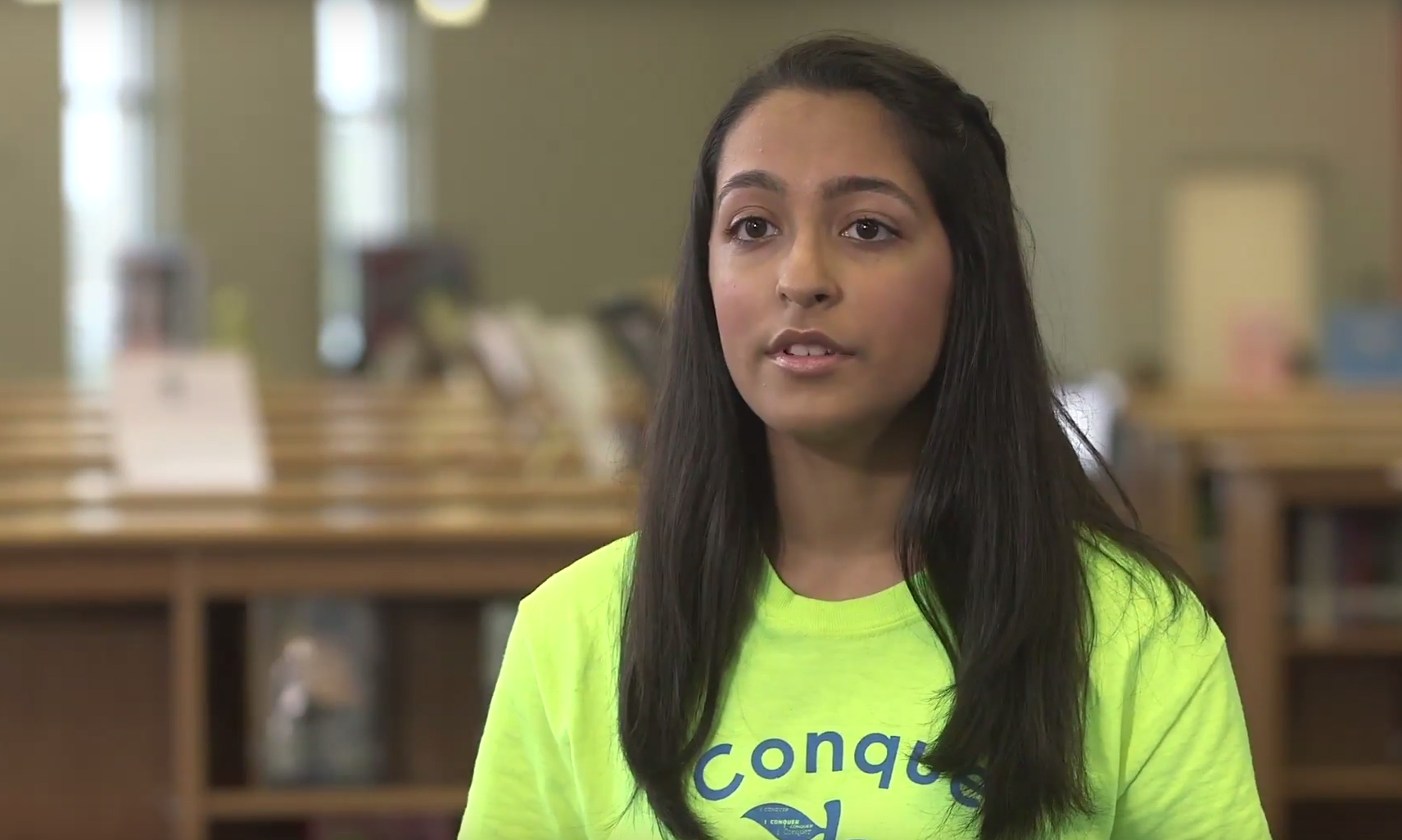
However, the Surani sisters quickly became aware that not all kids have the opportunity to learn about healthy choices at home.
In 2010, they became aware of the rising national childhood obesity trends in their own hometown of Corpus Christi (59.7% Latino) after their mother read them an article about how their city was ranked as the fattest city in America.
“Whenever that article came out, we were just like, ‘Oh my gosh, is this real?’” Zoya said.
From 2010 –2011, the Surani sisters did research into the obesity problem and found that, by the year 2030, more than half of America’s population is predicted to be obese.
They started learning about available obesity prevention programs.
Most prevention programs focused on middle- or high-school students, but kids usually start habits at the early ages of 3-7, according to the online research the sisters found.
Dr. Lynne Haverkos, a child development specialist at National Institute of Health, stated in an article that overweight toddlers are more likely to become overweight middle schoolers, high schoolers, and then adults, and went on to state that it’s important to take action early.
The sisters knew they wanted to take action.
“If we wanted to make a difference, we would have start with younger children,” said Zoya.
Their First Health Programs
The Surani sisters became involved at an early age in their parents’ nonprofit, the It’s Your Life Foundation, which conducts educational programs to encourage healthy lifestyles among local residents.

In 2012, the sisters worked with their parents and the foundation to create a multimedia educational presentation called KNIGHTS (Keep Nurturing & Inspiring Good Habits in Teen Sleep) to combat sleep deprivation in teens and promote the health benefits of sleep.
The sisters also helped create Ante Tobacco, another multimedia educational program in schools that uses music, a video, a cartoon book, and coloring book to tell about how a family of ants stays away from tobacco.
But what specifically could they do to tackle early childhood obesity?
They had a vision for a program, which they would call iConquer, to have high-school students go to elementary schools and give healthy food presentations to children ages 3-6 once a week for four weeks, with each presentation featuring 45 minutes of interactive teaching through food inspired names with puppet shows, songs, dances, games, animated videos, and other technology.
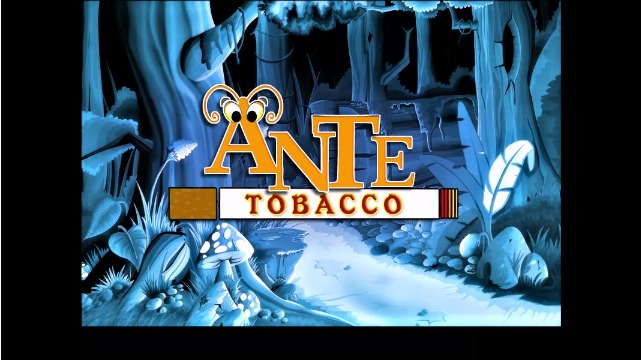
“We kind of knew how to go about it (iConquer), because of Ante Tobacco and KNIGHTS,” said Zoya. “But then we realized that it was for a completely different age group.”
In the summer of 2012, the sisters asked friends, Leslie Salomon, Aleena Villarreal, and Sophia Popakostas to see if they would support their iConquer idea.
“We needed a group to get out there and show the schools what we were made of,” said Zoya.
After knowing they had volunteer support from friends, they now needed funding.
Applying for the grants was complicated, as the Suranis’ did not have proof yet of the new program’s effectiveness, Zoya said.
The sisters worked together to gather grant applications and asked their parents for feedback on economic planning for the program.
The Suranis started applying for grants at the end of 2012. Their goal was to show how their program would be different from other obesity programs in that they were also focusing on diabetes. The program would also be different because they planned to work with a “successfully targeted” age group.
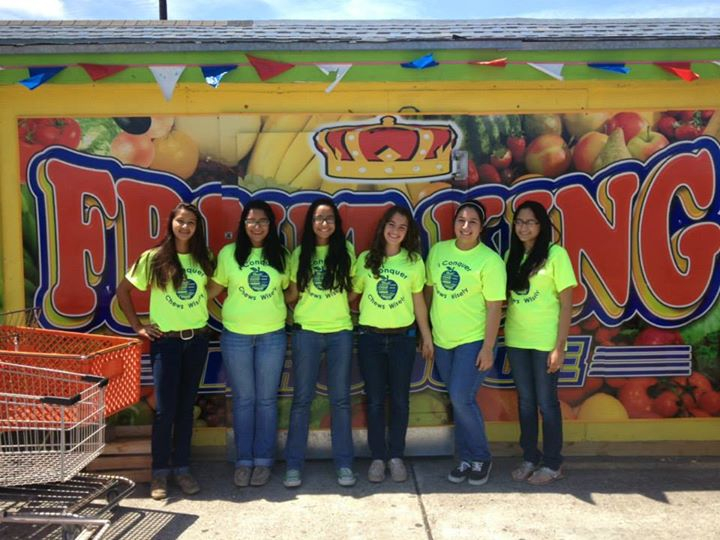
Studies have shown that ages 3-5 are pivotal, as these are the ages where healthy habits are best formed.
Getting Support for Their Big Idea
The Surani sisters were confident in knowing how to approach other organizations for support, as they had in the past with their previous programs and given their affiliation with the It’s Your Life Foundation, which has many local partners.
They reached out to Richard Torres, program specialist for health and physical education for the Corpus Christi Independent School District (CCISD), who helps schools have access to outside resources for health and fitness.
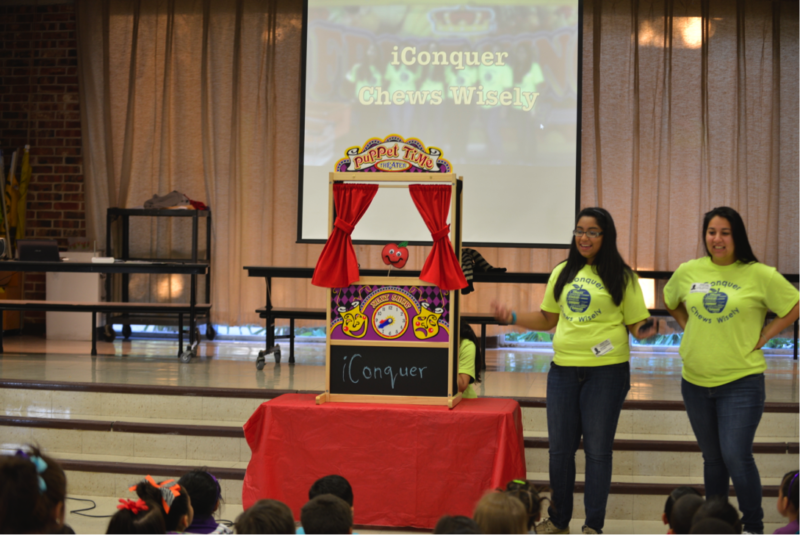
The sisters’ father, Dr. Salim Surani, contacted Torres before for the KNIGHTS and Ante Tobacco programs.
Torres told them he was excited about the new iConquer program.
He invited the girls to present at the CCISD community partner fair, where coaches from every district school could sign up for programs to come into their schools and do presentations or activities during their scheduled P.E. class.
After the sisters presented iConquer, 46 school coaches signed up. The coaches were ready for their students to discover all that iConquer could offer to help kids build healthy habits.
“Every school wants them (the Surani sisters),” Torres said. “They have programs not [just] for the young children, but they have programs for all ages.”
After the successful pitch, the sisters, their friends, and with help from some student council members started creating more developed iConquer presentation materials, including brochures, puppets, and activities.
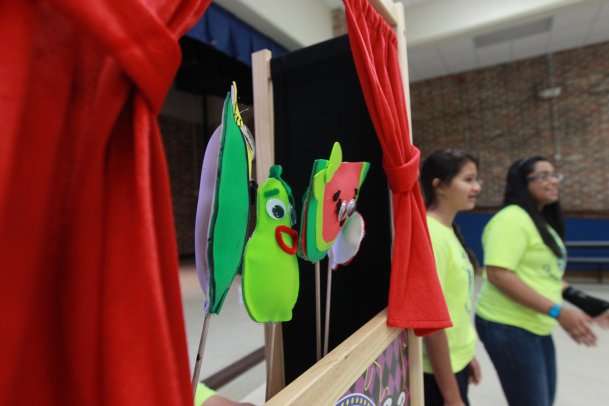
Then they continued to generate support and interest.
They reached out to and got the backing of Mayor Nelda Martinez and her Mayor’s Fitness Council, the CCISD School Board, and Dr. Scott Ellis, superintendent of CCISD. They also presented iConquer to the Junior League, local parents, and more.
“We were really excited to get [iConquer] started because we knew that once we got it started, we’d be able to make a difference and we could start bringing those statistics of obesity and diabetes down,” Zoya said.
What is iConquer?
iConquer aims to get kids moving, learning, and eating what is healthy and recommended to create lasting, healthy habits to help children conquer obesity.
A team of six or more high school students who visit local elementary schools conducts the full iConquer presentation, which runs for about 45 minutes to an hour once a week for four weeks.
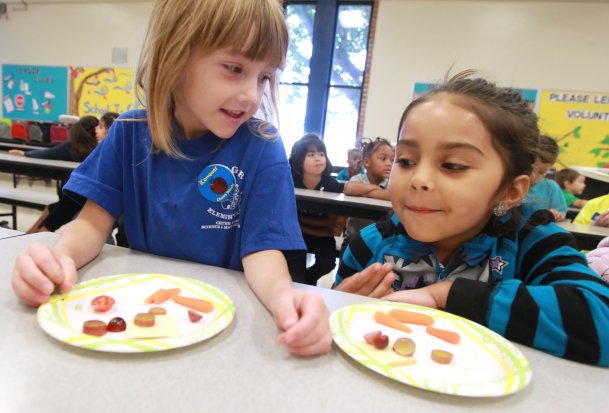
The interactive presentation includes a fun and creative music video, animated videos, dance routines, and puppet shows. Puppet shows feature food characters with special names like Sophia Squash, Zoya Zucchini, Sara Strawberry, and Alina Apple. The team also created fun rhymes and songs to help kids remember the puppet characters and healthy foods.
“We even have this portion plate jingle that we made, that we make it our mission to teach every single week,” said Zoya. “We sing it like 8 times the first week, four times the next week … everything we do, we say it in a way to help the kids remember it.”
Technology is also heavily involved.
Children take a test to learn what is considered healthy through pictures of different foods and objects by using an “iclicker,” or remote, to select from the images shown on a screen.
“This test is very important, as it not only shows the learning curve of the kids but also allows the program to track its results and success,” Zoya said.
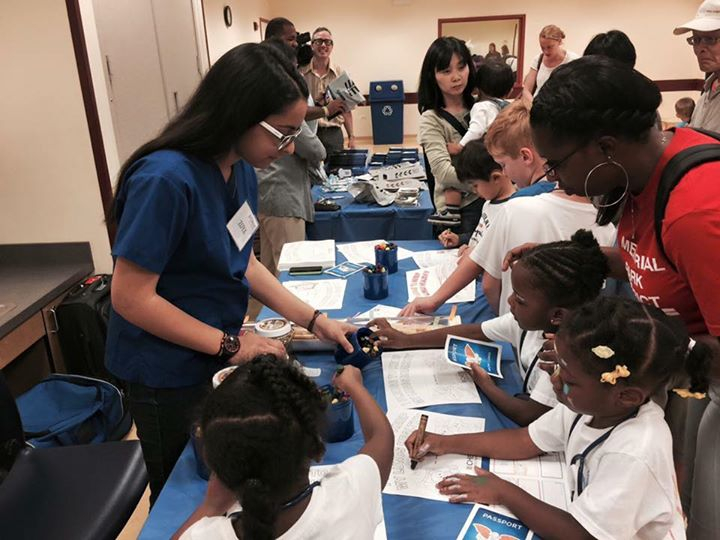
After approval of a $10,000 grant in 2012 and additional grants, and after many presentations to the community throughout 2012-2013, the iConquer program officially presented to its first student audience at Yeager Elementary School in the fall of 2013.
Jean Armstrong, a coach at Yeager, said Zoya and her sisters are always “cheerful, positive, and focused” during every iConquer presentation as they talk to kids on their level about diabetes and obesity.
“Many of the students relate to the discussions because many know someone in their family that has diabetes,” Armstrong said.
Taking iConquer into Schools
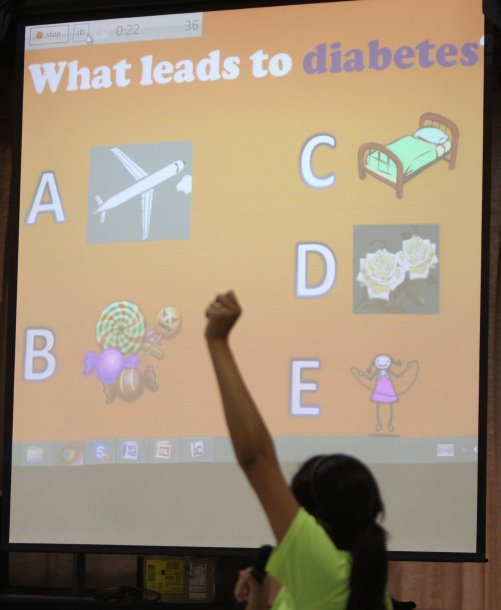
Over the last four years, the iConquer team has visited over 30 schools in the Corpus Christi area, as well as attended health fairs reaching thousands of kids through safe and interactive games and presentations.
“Every school wants them,” Torres said. “They want them back asking, when can they come back?”
Many low-income Latinos live in the area of the schools iConquer visits. Something that the Surani sisters discovered was that many Latino parents thought healthy foods were expensive and that the alternative of fast food or junk food was cheaper.
The sisters created food maps of the area to help Latino parents learn where healthy, affordable foods could be found. The sisters would visit with parents at health fairs and hand out these maps along with brochures of the iConquer program.
The sisters, although in different areas of life now, still help run and promote iConquer. Sara is attending Harvard University and has promoted the program to schools in Boston.
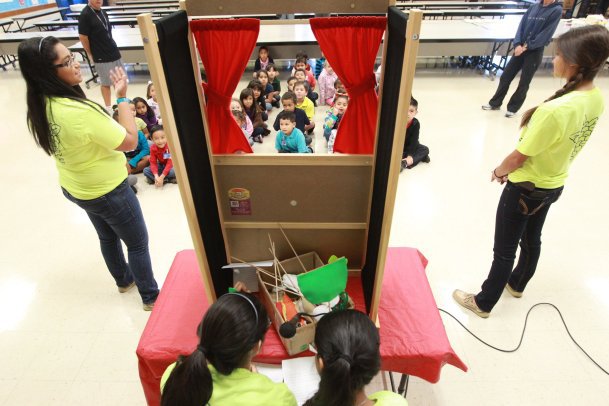
Zoya and Saherish still work at promoting iConquer and work with a team at the Veterans Memorial High School in Corpus Christi.
The sisters plan to keep the program going with students that are willing to step up and take the lead. There are now two high school teams with a full set of students trained and ready to teach the next group of interested students about the program.
People in California and in Austin, Texas, have also shown interest and have connected with and contacted the Surani sisters interested in starting the iConquer program in their schools, too.
“My motivation is found from the children we teach because their eyes light up when they try something that’s not only good but also healthy,” Zoya told the IT’S TIME TEXAS team in an article. “The way they love to live a healthy lifestyle is the greatest motivation anyone could ask for.”
By The Numbers
1
Supermarket
for every Latino neighborhood, compared to 3 for every non-Latino neighborhood
This success story was produced by Salud America! with support from the Robert Wood Johnson Foundation.
The stories are intended for educational and informative purposes. References to specific policymakers, individuals, schools, policies, or companies have been included solely to advance these purposes and do not constitute an endorsement, sponsorship, or recommendation. Stories are based on and told by real community members and are the opinions and views of the individuals whose stories are told. Organization and activities described were not supported by Salud America! or the Robert Wood Johnson Foundation and do not necessarily represent the views of Salud America! or the Robert Wood Johnson Foundation.



